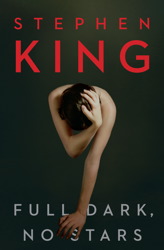Stephen King’s latest ‘gets in your face’
December 6th, 2010 Posted in OpinionReview by Mark Vuong
“[The best fiction] gets in your face. Sometimes it shouts in your face,” Stephen King wrote in his afterword to Full Dark, No Stars. Certainly, the four stories in King’s latest book succeed in getting in your face. Some of them even shout.
 • Full Dark, No Stars, By Stephen King, 384 pp., Scribner, 2010. $27.99 hardback
• Full Dark, No Stars, By Stephen King, 384 pp., Scribner, 2010. $27.99 hardback
Following Under the Dome, released in 2009, the prolific writer—who claims to write at least 2,000 words every day (although he has said himself never to trust a fiction writer)—serves another heaping stack of pages worthy of publication. All four stories in Full Dark, No Stars throw their protagonists into dilemmas where decisions have to be made, where consequences may result and are considered. Much like Different Seasons, another book of novellas, King goes light on the fantasy that is common in his works, and spreads a thick layer of reality. Readers follow a man with three identities—father, husband and murder; a writer who is raped; a man afflicted with cancer who is willing to increase his life’s longevity at the expense of his best friend’s well-being, and a wife who discovers she is living with a serial killer.
With this collection, King explores human behavior. His situations—murders and rape—are so close to home that it’s unnerving.
The 368-page book starts off with “1922,” which within its early pages sets the tone for itself and the subsequent stories when the protagonist, Wilfred Leland James, writes, “I believe there is another man inside every man, a stranger …”
The dark side of this story is that Wilfred is able to persuade—or brainwash—his son, a young teen, to aid in murdering the boy’s mother. Without spoiling the ending (though I don’t believe in spoilers, because it’s the presentation that matters most; everything else has been done), Wilfred’s insidious action causes his own mental breakdown—through guilt and regret—triggered mainly by his son, who was once a timid, courteous boy, but eventually becomes an unsympathetic, cold-hearted thief.
This is one of two stories that contains a fantastical element, which is played when Wilfred’s deceased wife pays him a visit to tell him what happened to their son.
In the second story of Full Dark, No Stars, “Big Driver,” King plays with the idea of a writer who hears voices in her head (who, after all, writes the stories? Surely not the writer, who is nothing but a conduit). After a roadside rape, the protagonist, Tess, decides to avenge herself and is able to do so with the help of the sagacious voices inside her head. Tess, just like any person living in the 21st century, navigates roads with the help of her GPS, a TomTom, even has it rigged to greet her personally every time it’s booted up—“Hello, Tess, I see we’re taking a trip.” However, her GPS isn’t just an ordinary dashboard GPS jacked into the cigarette lighter; hers is symbolic. The way King goes full circle to end the story with it, is brilliant.
The next tale, “Fair Extension,” is the second story that has a fantastical element: the devil. This one deals with the idea of making a deal with the red guy. Dave Streeter, who doesn’t have much longer to live due to cancer, strikes a deal with the devil, who sits on the roadside of Harrison Avenue Extension of Derry, Maine, with a table, a small television set and an umbrella. Of course, just as the Bible says, the devil is guised. Streeter doesn’t know who he’s dealing with until after the handshake, and doesn’t regret it either. The deal is that Streeter gets an extension of up to 15 years of longevity, and in exchange, he tells the pudgy man on the roadside who he despises: his best friend, Tom Goodhugh. At first, Streeter is unaware of what is going to happen to his friend. When Tom’s life—his three kids, his wife—begins to crumble, Streeter sits back and enjoys his added years.
The last story in the book is fashioned after a real-life event—Paula Rader, who was married to the infamous BTK (bind, torture and kill) murderer, Dennis Rader, for 34 years and knew nothing of his secret hobby. King, in his afterword, writes that he does believe she didn’t know, though many people claim otherwise. He wonders what it’d be like to be in such a situation, and that is how “A Good Marriage” came to be.
Though I hold a lot of respect and praise for King, there is one thing he usually does that bothers me. Most of his stories have an omniscient narrative that knows the future before it happens, giving big, glaring signs (by signs, I mean sentences pointing out the fact) of what’s coming. This style bothers me because it’s jarring as you’re reading along and, suddenly, seemingly out of nowhere, a single sentence says: “And that was the last time he’d talk to her because she will be dead in five minutes.” However, none of the stories in Full Dark, No Stars is graced by this omniscient narrative, for better or worse.
Whether you’re a Constant Reader or not, do not skip the afterword, which reveals a piece of King’s personality when it comes to writing and how the stories in Full Dark, No Stars were inspired. Reading it will only make your experience of the book more fruitful.
This author has been writing with verve and unyielding love for the art and craft of fiction for more than 45 years, and every story—fiction, forewords, afterwords—bleeds from the letters with them.
TP
Tags: book review, fiction writing, Stephen King

Sorry, comments for this entry are closed at this time.